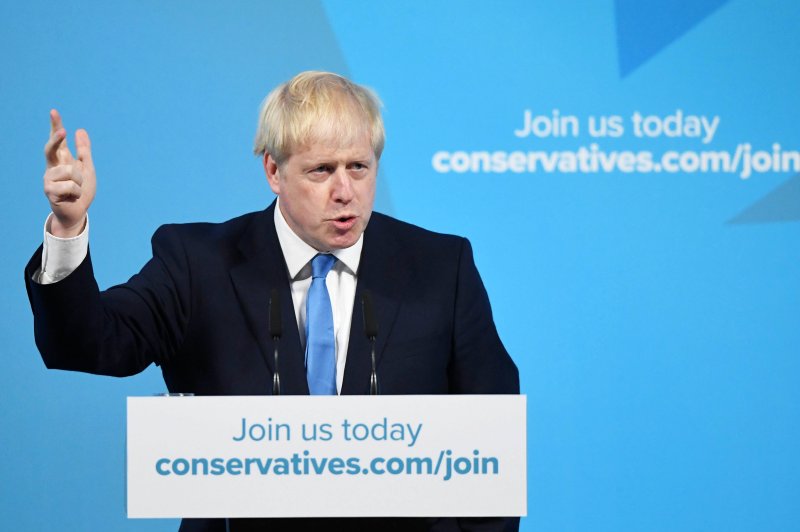1 of 2 | Boris Johnson holds his acceptance speech after he is announced as the new Conservative party leader at an event in London on July 23, 2019. Photo by Neil Hall/EPA-EFE
LONDON, July 24 (UPI) -- Boris Johnson will travel to Buckingham Palace to ask the queen's permission to form a new government. It will be granted. And for Mr. Johnson, the challenges as Britain's prime minister may not be as daunting as Churchill faced in 1940. But they will be every bit as difficult as those confronting Margaret Thatcher 40 years ago.
Brexit tops the list. However, Britain faces a crisis in the Gulf after Iran seized two of its tankers following the Royal Marines capture of an Iranian ship in the Mediterranean. The Conservative Party is profoundly and possibly irreversibly divided over Brexit and must be united if the new government is to succeed. But the coalition is fragile, meaning it could fall, bringing elections and possibly a different prime minister.
To succeed, Johnson must resolve the Gordian Brexit debacle. While he has promised Brexit under all circumstances, should it be clear that a "hard landing" would be catastrophic or at least very damaging, Johnson would be wise to consider within a tight and loyal circle, options. European Council President-elect Ursula Von der Leyen has generously offered a stay of execution beyond the current Oct. 31 deadline.
A review of the consequences of a "hard landing" is in order. If that assessment showed how disastrous Brexit would be, Johnson could blame the prior government for failing to disclose that finding and accept the offer of an extension, promising as Donald Trump would, to secure a far better and fairer deal. Using the agreement negotiated by Theresa May as the starting point, Johnson could introduce several changes as "deal-makers." Of course, Johnson would have to persuade Brexit hardliners to accept his deal, arguing that without one, the government could fall and the Tories would be in the political wilderness for a very long time -- which they would be.
If the new prime minister were seeking a one-liner sound bite, "opportunity" is it. Under the Johnson premiership, Britain will exploit new opportunities. A smart Brexit, he would argue, will unlock Britain's contained economic engine. The opportunity to take a new global leadership role, linking both sides of the Atlantic and building bridges with friends and adversaries, is sorely needed.
But the Persian Gulf poses a major problem. While Britain, along with Israel and America, is considered one of the "great Satans," that does not mean some form of secret negotiation might be in order to save the Joint Comprehensive Plan of Action (JCPOA) that prevents Iran from acquiring nuclear weapons and defusing tensions generated by the Trump administration's "maximum pressure" many believe is in place to force a regime change. Johnson would have to exercise supreme care so that any contact does not explode in his face. However, Britain enjoys special relationships with several Gulf states that might be supportive of this approach. And if successful, this would show Johnson's statesmanship and defuse criticism of his inability to lead.
With America, his choice of the next ambassador is important. The safe bet would be appointing a Foreign Office professional diplomat. Johnson could cater to Trump with an appointee favorable to the president. Or he might reach into the Lords to find someone of stature and experience such as former NATO Secretary General and U.K. Defense Minister Lord George Robertson. While Robertson is Labor, his appointment would be a dramatic sign that Johnson is to be taken seriously.
Regarding defense and national security, Britain's military is in dire need of more money. The Treasury may find that unaffordable. But under the circumstances, Johnson has no choice except to argue that opportunity requires a strong defense. He also has another opportunity with the British defense industrial base.
Real costs of defense have skyrocketed as people and advanced technologies are very expensive and growing. An F-35 costs about 80 million pounds ($99.8 million). And maintaining a professional force demands ample incentives in pay and benefits.
The British private sector however has many companies engaged in technologies that cover the information, cyber, space and other domains with strong defense applications. A high-low division of labor with the U.S. in which America focuses on the more expensive technologies and Britain the lower cost and higher leverage ones could be very appealing. This is another opportunity for the new prime minister to pursue.
Finally, Johnson needs to emulate Churchill who weaponized language and sent it into battle. A clever writer, Johnson knows that powerful oratory, as both Churchill and FDR put to good use eight decades ago, makes a huge difference. A divided public must be convinced of the new government's ability to lead. After Wednesday we shall see what follows.
Harlan Ullman is a senior adviser at the Atlantic Council. His latest book is "Anatomy of Failure: Why America Has Lost Every War It Starts." Follow him@harlankullman.















